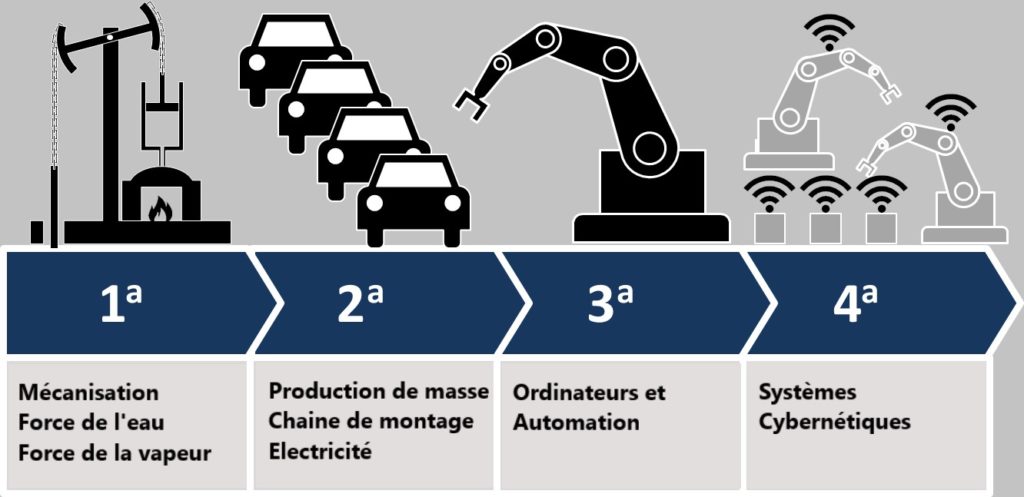The industrial revolution is at our doorstep, and with it emerges a major concept: Industry 4.0. This phenomenon is radically transforming the business landscape, particularly in Africa, where companies must adapt to avoid falling behind. This new era, characterized by the integration of digital technologies into production and logistics, marks a decisive shift towards intelligent automation and enhanced connectivity within value chains.
At the heart of this transformation, contemporary companies face various impacts and challenges. Improvements in terms of operational efficiency and cost reductions are on the horizon, but these benefits also come with challenges such as workforce reskilling and cybersecurity of systems. Therefore, understanding the ins and outs of Industry 4.0 is essential to leverage the opportunities offered while navigating the inherent complexities of this transition.
The challenge is no longer just to innovate, but to embrace a systemic transformation that redefines the norms and standards of the industrial world in Africa.

Table des matières
ToggleDecoding Industry 4.0: Impacts and Challenges for Contemporary Businesses
Industry 4.0, often described as the fourth industrial revolution, results from the integration of digital technologies across all production processes. In this sense, it radically transforms the industrial landscape and the functioning of companies. More than just a technological change, Industry 4.0 represents a true mutation in ways of working, interacting, and producing.
Recent Data: A Quantitative Overview of Evolution
Regarding the adoption of Industry 4.0, a study conducted by McKinsey reveals that 55% of companies in Europe and 65% in North America have already begun their transition to this new era. In Africa, although the adoption rate is still low, it is rapidly expanding with growth projections reaching 22% by 2025.
Connected production systems use smart machines that interact with each other via IoT (Internet of Things) sensors to optimize productivity. A report by Gartner predicts that by 2024, over 70% of organizations will use AI and digital twins to improve operational efficiency.
Case Studies: Concrete Applications of Industry 4.0
An emblematic example of the 4th industrial revolution is found in the automotive sector. The production line of Ford, for instance, has integrated autonomous robots equipped with artificial intelligence to perform certain tasks, thereby reducing human errors and increasing efficiency by 20%. This significant change has not only reduced costs but also enabled Ford to respond more quickly to market demands.
In Africa, companies like Alba are using advanced technologies to modernize their processes. Through their partnership with ARRAY Innovation, Alba has improved its logistical efficiency and reduced its carbon footprint while increasing customer satisfaction. These examples illustrate not only the adoption of new technologies but also the direct benefits that arise for companies.
Practical Recommendations and Applicable Strategies for Businesses
To successfully navigate the era of Industry 4.0, it is essential for companies to adopt a proactive approach. Here are several practical recommendations:
- Invest in training: Employees must be trained in new technologies and SysAi to maximize their potential. Continuous training programs can foster a skilled workforce that quickly adapts to technological changes.
- Adopt modular technologies: Systems should be designed modularly, allowing for a gradual integration of new technologies without the need to rebuild the entire infrastructure.
- Strengthen partnerships: Collaborations between companies, universities, and research centers can foster innovation and knowledge sharing, essential for developing new solutions.
- Implement cybersecurity strategies: The increase in interconnections also heightens cybersecurity risks. It is imperative to protect sensitive data and ensure that systems are secured against potential attacks.
These strategies, if effectively implemented, will allow companies to fully benefit from Industry 4.0 and remain competitive on a global scale.
Sustaining Through Innovation and Sustainability
Companies that succeed in adapting to Industry 4.0 should not only focus on efficiency but also on sustainability. For instance, using AI to analyze data can also lead to more eco-friendly production practices, reducing waste and optimizing resource use. Companies like Lectra have created smart platforms to guide the clothing sector towards responsible production practices.
Africa, with its rich biodiversity and natural resources, has the opportunity to integrate sustainable practices into its industrial model. The development of local solutions through Industry 4.0 can transform the economic landscape while preserving the environment.
Conclusion: A Necessary Transformation for a Better Future
As Industry 4.0 redefines the rules of the game in the industrial sector, contemporary companies must rethink their operational models and strategic approaches. By investing in innovative technologies and adopting sustainable practices, they can not only improve their efficiency but also contribute to a more responsible world.
To delve deeper into the topic and discover more initiatives, visit Juristes Environnement or explore other resources on the impact of Industry 4.0.

FAQ on Industry 4.0 and Its Challenges
What is Industry 4.0? Industry 4.0, also referred to as the fourth industrial revolution, refers to the integration of advanced technologies such as artificial intelligence, the Internet of Things, and automation into production and logistics processes.
What are the main impacts of Industry 4.0 on businesses? Companies benefit from optimization of operations, cost reduction, increased productivity, and improved quality of the products and services offered.
How can Industry 4.0 transform logistics? Through the adoption of digital technologies, logistics becomes more agile, efficient, and responsible, thus better responding to the needs of customers and suppliers.
What challenges might companies face when transitioning to Industry 4.0? Companies may encounter cybersecurity issues, a lack of digital skills, and significant initial financial investments required to modernize their facilities.
How can companies prepare for Industry 4.0? It is essential for companies to adopt a strategy of continuous training, engage in technology partnerships, and develop gradual adoption plans for new technologies.
Which sectors are most affected by Industry 4.0? Manufacturing, logistics, healthcare, and energy sectors are among the most influenced, with significant transformations in their operations and services.
What tools can help companies in the transition to Industry 4.0? Tools such as supply chain management systems, digital twins, and data analytics are crucial to support this transition.
“`





